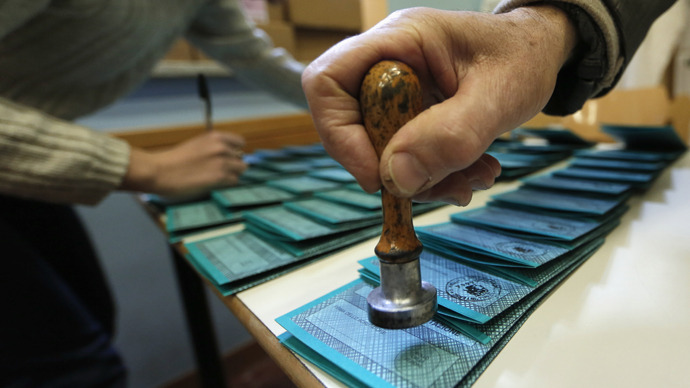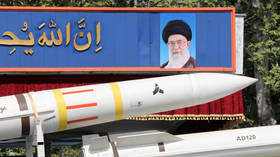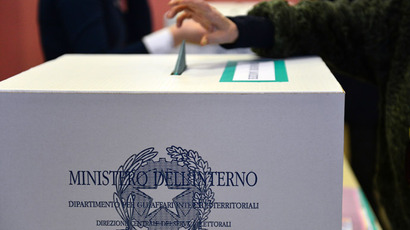Italy in political deadlock as vote brings no clear leader

Italy's parliamentary elections are heading towards a stalemate as initial results show the center-left forces of Pier Luigi Bersani and the coalition of former premier Silvio Berlusconi locked hand in hand in a crucial race.
With most of the votes counted, the forecasts imply the
center-left will end up with a close lead in the race for the
lower house of Parliament and the Senate.
The latest projections show Bersani, who took the lead with 29.55 per cent for the lower house, is closely followed by Berlusconi with 29.18 per cent of votes.
In the upper house, Berlusconi’s bloc is so far trailing with 30.72 per cent, as opposed to 31.63 per cent for Bersani’s coalition.
Beppe Grillo’s anti-establishment Five-Star Movement is at 25.54 per cent in the lower house and 23.79 per cent in the Senate, the projection said.
Former PM Mario Monti's coalition is expected to garner only 10.56 per cent in the lower house and 9.13 per cent in the Senate.
Earlier, RAI projections stipulated that Bersani would secure the Parliament while Berlusconi would take the Senate.
The Italian Democratic Party’s secretary Bersani might be favored by the people in his own country, but he also satisfies EU economists, as he promised to stay committed to budget discipline without pushing austerity too far. He’s sought to satisfy both spheres by promising to improve the alarming state of the country’s economy and assure stability in the eurozone, which, some fear, may not endure the Greek scenario to be repeated in Italy.
Monti, who introduced the budget discipline in Italy in the first place, said his coalition will back Bersani’s center-left bloc. However, the outgoing prime minister has become so unpopular in Italy due to his social cuts program that the centrist coalition, With Monti for Italy (Con Monti per l'Italia), is showing very low results in polls.
Having been the Italy’s prime minister four times and heavily mired in scandal, Silvio Berlusconi and his People of Freedom centre-right alliance still proves to be popular with Italians, promising to reform an unpopular property tax. During the pre-election campaign, Berlusconi chose to blame Monti and Germany for Italy’s economic crisis.
A rising new power in Italian politics, former comedian Grillo and his 5-Star Movement has extensively used the anger of austerity-wearied Italians to gain popularity. Grillo’s anti-establishment movement has gathered support on the wave of recent protests, and particularly appeals to the frustrated younger generation suffering from unemployment. Some fear, however, his stance may only destabilize the future government’s work. Grillo has campaigned for Italy’s debts to be cancelled and for a referendum on Italy’s stay in the eurozone to be held.
The exit polls offer only a basic preliminary picture, and the actual allocation of seats in Italy’s parliament will depend on such additional factors as possible coalitions and the twists of a complicated electoral system.
For the Italian government to be able to pass legislation, it must have a majority both in the Chamber, and the Senate, and to achieve this majority coalitions are often formed.
To obtain control of the lower house, the party, or bloc must simply win the majority in the national popular vote. The election winner is automatically assigned 54 per cent or 340 seats in the 630-seat Chamber.
But in the upper house the seats are distributed on a
region-by-region basis. That may potentially lead to opposing
forces gaining control of the two chambers, leading to gridlocked
decision-making.
In order to enter the Italian houses of parliament at all, a pre-election coalition must overcome the 10 per cent threshold for the Chamber and 20 per cent threshold for the Senate. Moreover, the parties within coalitions are further filtered out by 2-3 per cent barriers. For individual parties not linked to any bloc the thresholds are 4 per cent and 8 per cent respectively.
According to strategic and political analyst Paolo Raffone, deciding and forming a ruling government is “very chaotic.”
“It is not certain if the government can be formed, if not
the coalition government involving almost all the major political
forces that are present in the parliament,” Raffone told
RT.
Italian elections result is ‘about Europe and its future’
Increasingly more Italian voters have become disillusioned with all the major candidates present.
“We’re living a tragi-comic moment, with lots of fantastical promises, and I don't think whoever wins will have a stable majority,” 77-year-old voter Luciano Pallagroni told AFP.
“After this aberrant campaign with idiot candidates, I hope that there will be a real change, with tangible results for Italy,” another voter, a student named David, was quoted.
Still, the 2013 election results are very important, according to politics professor Roberto D’Alimonte, as they carry implications not just for the country itself, but for the whole eurozone.
“In 1994, the consequences were only about us. That is not
the case anymore, now they are about Europe and its future,”
D’Alimonte said.














